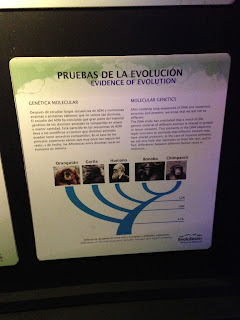I had read online that the bus to this park/resort, Biocentro Guembe, left at 10 am if I did not want to take a taxi. The taxi would cost about 60-80 Bs one way, and even splitting that with someone else meant that it would cost about 70 Bs. Instead, we found information on the Guembe park Facebook page that gave us an address from which the bus would leave, and it actually turned out really well! Daniel and I ended up being the only two on the bus, but it left exactly at 10:00 am, so I wonder if some people missed it.
Biocentro Guembe is incredible! The ground there was still a
little wet from the rains yesterday (which was unfortunate), but I had a great
time. In essence, it’s a hotel resort combined with a nature preserve and small
museum that is just fantastic.
Daniel and I got off the bus after about a 20-minute ride.
The entrance fee to Guembe was a lot more expensive than most other things in
Bolivia (150 Bs or about $22), which can be highlighted by the fact that the
bus ride was 10 Bs round trip (less than $1.50). Since the area is
privately-owned, I think that explains why the entrance was so much. Either
way, I think it was worth it. The park is large, and front-loaded with the
preserve/museum attractions. They have a butterfly lab where they take eggs and
caterpillars from their butterfly sanctuary for a safe place to grow, a green
area with alpacas, and a swamps with capybaras. We went to see those before
venturing into the “Evolumuseo”, or museum on evolution.
I loved that they had one of these! It was small – one large
room and one small one, but had some extraordinary information. The museum
detailed the evidence behind evolution and explained in a way that a layperson
could start to understand, and was kid-friendly. It had a beautiful evolution
tree that brought to life the concept of a phylogeny tree and comparisons of
skeletons that show what Darwin meant by natural selection/adaptation to the
environment. In the center it showed what DNA looks like, in a structure that
was made up of old phone books and lighted in a way that could show
complementary base pairing. Seriously, this was incredible! In the US, you
would be hard-pressed to see something so thorough in favor of evolution as
scientific fact (which it is) – and not being afraid to call creationism
something with literally no scientific evidence to support it.
Our next stop was a terrarium – basically an exhibit of
turtles, ants, iguanas, and termites – to show their importance and impact on
soil and the earth.
Along the path after that was a diversity totem pole! We
then moved on to the turtle sanctuary.
The aviary was the most awesome because we were able to walk
in sanctuary itself. We could actually get right up next to so many of the
birds – it was the closest I’ve ever been to birds! We even saw two peacocks,
but I couldn’t get them to open their plumes.
At the center of the aviary was a long set of stairs that
led to a lookout point, which I was excited to go see since I love the
modernity of Santa Cruz. It would have been incredible to see from up top, but
we were too far away to really it. Instead, we saw the tops of a forest. Could
have been worse, though.
By this time we wanted to go back towards the entrance to go
on a tour of the park, so we started heading that way. The guide was a French
guy named Ben (are all tour guides in Bolivia from France?) who was really
nice. He showed us to the butterfly and bird sanctuaries before taking us to
the orchid sanctuary. I had thought it wouldn’t be that impressive since
orchids are just flowers, but the area was actually really, really gorgeous,
even though orchids weren’t really in bloom!
We ended the tour at the pools – they look magnificent
except for the fact that it was chilly outside and the water was even colder. I
even remembered to bring my swimsuit but just dipped my feet in because I
didn’t want to catch a cold, or weaken my immune system any more.
We rested a while and used the free wifi before heading to
Isla de Monos, or Monkey Island. The park has three natural ponds/lagoons, and
the first two separate the day trip/exploration area from the hotel out back.
It looked really nice, but the prices hurt my soul – rooms between $50 and $150
per night. Pretty sure I could live a month on $150 now, especially since I’m
Couchsurfing. The monkeys on the island were a little far away to photograph,
but we could see them swinging on the playground of tires and ropes on the
island! They weren’t too active because it was a lot colder outside than normal
in Santa Cruz, but I’m glad we got to see some of them.
Before we left, we went to the garden! They had a cool
square divided into several kinds of herbs including oregano, thyme, mint,
spearmint, basil, etc.
We were exhausted by the time it was time to leave, but we
walked around a little to find this street food that tasted pretty incredible!
We split the plate for 5 Bs each – completely worth it!




























No comments:
Post a Comment